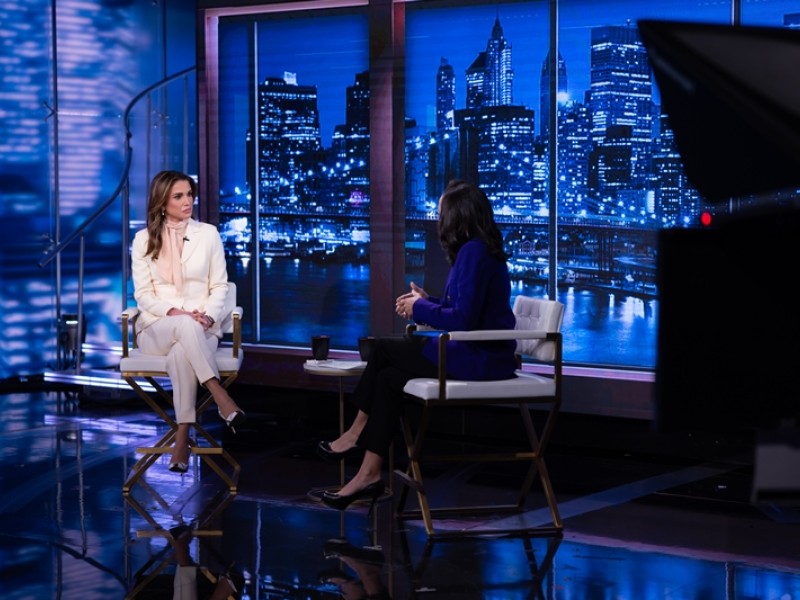In the Situation Room, Queen Rania Talks Peace in the Middle East

Wolf Blitzer: Your Majesty, how worried are you that there could be a war involving Iran sooner rather than later?
Queen Rania: Well, obviously, a war is always something to worry about. And, as you said, our region is already riddled with so much conflict that another war would definitely not be something that we would welcome.
When it comes to the issue of the nuclear program, it's important for Iran to abide by international regulations and to remain open to inspection by international regulatory bodies. And clarity and transparency are what are is important here.
And beyond that, it's important for this issue to remain on the international negotiating table. This is not a confrontation between the United States and Iran. I think if there are any threats, then those are threats that will affect the international community, and, therefore, we all must have a unified stance with regard to this issue and ensure that we explore all diplomatic avenues before we make any move toward military action.
Blitzer: There seems to be a potential for military action elsewhere, not far from Jordan, as well. Turkey very concerned about the Kurdish rebels, the PKK terrorists in the northern part of Turkey -- excuse me, of Iraq, in the Kurdistan part. How worried are you about a full scale war erupting on the Turkish/Iraqi border?
Queen Rania: Well, we obviously understand Turkey's concern and we support Turkey's government and its need to protect itself from any terrorist attacks.
However, I believe that a full scale military action, again, will, destabilize the region. And so it's very important for the Iraqi government, as well the leaders in the Kurdish-controlled region, to work together to ensure that the PKK fighters do not cross the borders into Turkish territory and for there -- therefore not to be an escalation of this conflict.
Very important for Turkey to continue talking to the Iraqi government because, at the end of the day, we need to ensure that we protect the territorial sovereignty of Iraq.
And, as you know, the Kurdish-controlled region is probably one of the most stable regions in Iraq at the moment. And we can ill afford more conflict in Iraq. The situation, as you know, in Iraq is very, very unstable. And although the conflict is probably the most talked about conflict, what people really need to focus on, as well, is the humanitarian situation in Iraq.
More world attention needs to be paid to what is going on to the average Iraqi woman and child. More difficult to be a child in Iraq than it ever was in history. We have more than one in four children under the age of five who are malnourished.
Blitzer: In Iraq.
And there's an enormous, excuse me for interrupting. An enormous amount of displaced people internally, externally about 2 million refugees and Jordan has taken in nearly a million refugees, I believe, which has put an enormous strain on Jordan.
Queen Rania: Jordan has taken in about 700,000 refugees, which, obviously, has stretched Jordan. It's put a tremendous amount of pressure on infrastructure and our environment and our resources. You know, displacement is a very tough for those that are displaced and for the country hosting them.
And no one country is responsible. I think the humanitarian situation the international community and we must work together to make sure that we restore stability and security to the lives of these, of these families.
Blitzer: So, your majesty, I'll ask you a blunt question. Was the U.S. invasion of Iraq a blunder?
Queen Rania: Well, I think there is no simple answer to that question. You know what we have today is a multi-facetted problem that needs a multi-facetted solution. We will have to work together as hard as we can to restore safety and stability because at the end of the day the prosperity and stability of Iraq is in the best interest of all of us.
And, again, I want to emphasize the humanitarian situation, very, very important for us to really work together to ensure that the Iraqis can go back to normality in their lives.
When you talk about displaced, a lot of those leaving Iraq are the doctors, the scientists, the engineers. Those are Iraq's best hope of rebuilding the country. So, reconciliation and reconstruction needs to happen as soon as possible.
Blitzer: How damaged is the U.S. image, the U.S. reputation in the Arab and Muslim world?
Queen Rania: Well, there are some negative perceptions of the United States and the Arab world. And, as you know, since 9/11 and since the war in Iraq, tension business between east and west have been become very inflamed.
But you know nothing is not reversible. We can work on this. We can try to bridge those differences. We can try to overcome the mutual suspicion and trust.
First and foremost, we can do this by trying to resolve the core issues in the region, mainly the Palestinian and Israeli conflict, as well as the situation in Iraq.
You know over the past seven years, not much has been done with regards to finding a resolution to the Israeli Palestinian issue. And, today, we have a situation where we have a good chance of finding a final solution, a final just solution to this issue. Hopefully next month there will be the peace conference that the American administration is working very hard to back and we have engagement from many different Arab countries that are backing this up, as well, I just hope we can finally put this to rest.
Blitzer: You have been here in the United States attending a military conference out in California that the first lady of California, Maria Shriver, hosted and you're hoping to improve the status of women in the Muslim world and Arab world, including in Jordan. You have your hands full.
I'm going to read to you from the state department's last human rights report on the treatment and status of women in Jordan because I think it does underscore that there are some serious problems. "Women experience legal discrimination and pension and social security benefits inheritance, divorce, ability to travel, child custody, citizenship, and in certain limited circumstances, the value of their Shari'a or Islamic law court testimony." It's still serious problems involving women in Jordan.
Queen Rania: Absolutely. You know we have many challenges. But let us not overlook the many achievements that have been made.
You know in education, women have achieved incredible results. We have higher number of female college graduates than we have male. Primary school enrollment is almost universal and equal between boys and girls.
We have women who are in politics and in parliament and the cabinet. They have the right to vote and be voted into public life. We have many woman in the private sector and women in the judiciary system, judges. We have women in the army.
So women are really making their mark and a lot of progress.
Having said that, we still have many hurdles and many challenges, but more than just changing policy and changing some of the legal framework that may hinder women's progress. I think we need to work on changing some of the mindsets and cultural perceptions that stand in the way sometimes. You know, where women sometimes feel that they have to make a choice between their career and their family where there are sometimes a culture of dependency on the male and a member of the family.
So, but change is happening and there is so much to be celebrated. I'm so proud of so many achievements that I see every single day in Jordan. And our job is to really highlight at the grassroots some of those success stories because these are the women that are very quietly and proudly eroding some of the negative stereotypes.
Blitzer: And I know you have been an excellent role model for a lot of women not only in Jordan but elsewhere in the Arab world and in the Muslim world.
Queen Rania, Your Majesty, I know you have been on a busy schedule, thanks so much for spending a few moments with us.
Queen Rania: It's a pleasure. Thank you, Wolf.
© Copyright, CNN
Featured
Queen Rania's official website
This website does not support old browsers. To view this website, Please upgrade your browser to IE 9 or greater
Your browser is out of date. It has known security flaws and may not display all features of this and other websites. Learn how to update your browser



